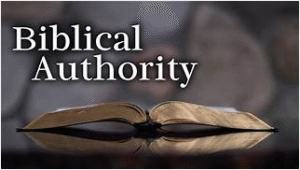By What Authority?
Mike Johnson
 “By what authority are You doing these things? And who gave You this authority?” These two questions, asked in Matthew 21:23, were asked of Jesus by certain chief priests and elders of his day who were trying to trap him. Although their motives were not good, their questions showed they understood the need for authority and that authority must come from one who has the rightful power to grant it.
“By what authority are You doing these things? And who gave You this authority?” These two questions, asked in Matthew 21:23, were asked of Jesus by certain chief priests and elders of his day who were trying to trap him. Although their motives were not good, their questions showed they understood the need for authority and that authority must come from one who has the rightful power to grant it.
Jesus responded by asking (vs. 25), “The baptism of John — where was it from? From heaven or from men?” The response of Jesus shows that there are only two sources of authority, which are “heaven” or “men,” i.e., “divine” or “human.”
It is essential to understand the need for authority in our relationship with God and where it rests.
Actually, “standards” of authority are accepted in just about every realm and relationship. For example, we know that 16 ounces equal a pound, 12 inches is a foot, and 3 feet equals a yard. These are accepted standards in our society. Imagine the confusion that would exist if everybody had their own standard of weights and measurements. Imagine the turmoil that would ensue if people were allowed to mint their own currency or if no one were willing to abide by the decisions of our court system. An accepted standard is critical in secular matters; it is essential in our relationship to God.
Where does authority rest in religion? There are three possible answers. First, there is internal human authority. Conscience, one’s judgment, personal tastes, and feelings are all examples of this type of authority. Second, there is external human authority. This type of authority involves custom, tradition, human creeds, and church councils. The third possibility is divine authority. This authority, of course, has God as the source, is centered upon Christ, and is recorded and revealed in the Bible.
Of the three possible sources mentioned above, it is clear that we must follow divine authority (Col. 3:17, I Pet. 4:11, II Jn. 9, Rev. 22:18-19, Gal. 1:6-10). Internal and external human authority produce confusion, denominationalism, and strife. The reason for this is in Proverbs 14:12, which says, “There is a way that seems right to a man, but its end is the way of death.” Further, it is impossible to achieve the unity which Jesus prayed for (Jn. 17:17-21) if we cannot at least agree upon the Bible as our only source of authority. The Bible might be called an infallible book by which fallible people can achieve the unity which Christ desires. Further, any attempt to use either form of human authority will allow innovations and additions into the Lord’s church. We must DEMAND authority from God’s Word for every belief and practice.
The question raised by the Jewish leaders of needing authority and having it from the proper source is undoubtedly essential. Remember, all authority is either human or divine. What authority, or standard, do you use?

